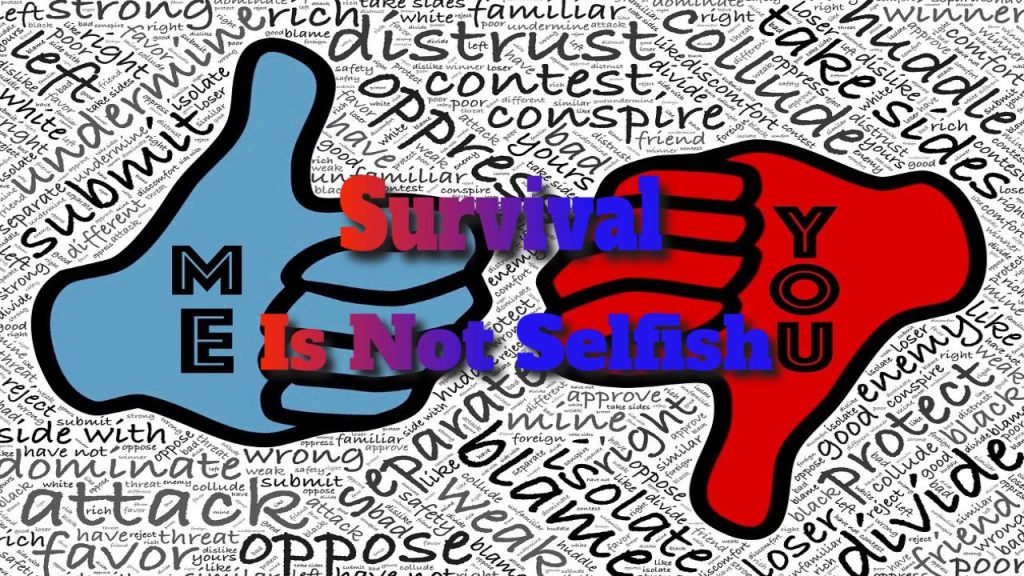Why Survival Is Not Selfish
Have you ever wondered why putting one's survival first isn't considered selfish?
At first look, this concept may appear paradoxical; nevertheless, when you go deeper, you will discover that survival entails more than only protecting one's own life. Instead, it provides the framework for empathy, compassion, and total well-being, both for oneself and for others.
Now, let's look at why survival is more than just a self-serving activity, and how it might benefit the environment.
The instinctive drive to survive
The fundamental urge that we all have kicks in when it comes to survival, driving us to do whatever it takes to keep ourselves safe. This underlying instinct for survival is profoundly ingrained in us, guiding our actions and decisions when we are in danger. Because of this, we must prioritize our safety above all else.
The will to survive leads us to seek refuge in bad weather conditions, obtain food and drink when resources are scarce, and protect oneself from potentially dangerous situations. This inclination drives people to adapt, be resourceful, and persevere in the face of adversity.
Our need to survive is not selfish; rather, it is an instinct that protects our survival in an uncertain and perilous world.
Self-Preservation and Personal Responsibility
If you want to live, you must accept responsibility for your health and prioritize self-preservation. If you find yourself in a perilous circumstance or an emergency, you must make decisions that will safeguard and save your life. Nobody else is capable of accomplishing it for you.
When you admit that your survival is ultimately up to you, you are accepting personal responsibility. To be better prepared for future threats, adopt proactive measures such as stockpiling emergency supplies and strategizing.
Along with that, it entails making decisions that prioritize your health and well-being, such as practicing self-care, living a healthy lifestyle, and seeking help when necessary. Accepting responsibility for one's own life and well-being is an essential component of self-preservation, which does not imply selfishness. Self-preservation is an essential component of survival.
Balancing self-care and altruism
Consider the difficult balance that must be maintained in survival situations between self-care and caring for others.
Taking care of oneself during a crisis is critical for maintaining excellent physical and emotional health. As a result, you'll need enough of food, water, and rest to maintain your strength.
However, it is critical to recognize that attempting to survive is not a one-time event. Offering assistance to others wherever possible, sharing resources, and collaborating to improve everyone's chances of survival are all examples of how to show concern for others.
To achieve a balance between self-care and compassion, you must make informed decisions that consider both your own needs and the needs of those around you. If you can strike this balance, you will be able to manage survival circumstances with empathy and teamwork, increasing the likelihood of a positive outcome for everybody concerned.
Survival: A Foundation for Empathy and Compassion
Survival is an important motivation to consider when developing empathy and compassion. When you are continuously battling for your survival, you realize the importance of empathy and compassion for others.
When you are in a difficult circumstance, you realize that you can't rely just on yourself; you also need the help of those close to you. This insight aids in the development of empathy by allowing you to put yourself in the shoes of others and understand their struggles and concerns. Your compassion grows stronger as you recognize the need to assist those in need.
The Ripple Effect of Prioritising Wellbeing
If you prioritize your health, you will start a chain reaction that will benefit others around you. When you prioritize your health, you may have a greater impact on the lives of others. To become more robust and capable of conquering life's obstacles, you must care for yourself on all levels: physically, psychologically, and emotionally.
As a result, you can provide support and strength to people who rely on you. If you prioritize your health and happiness, you demonstrate self-love and self-care while also inspiring others to do the same. Maintaining a happy attitude and energy allows you to spread happiness through your contacts and social networks.
How do external circumstances influence survival instincts?
Several extrinsic factors may influence survival instincts. These elements include the environment, societal standards, and cultural beliefs.
These external forces have the potential to modify your survival instincts, influencing your choices and actions.
What are some practical strategies to reconcile self-care with altruism in survival situations?
In life-threatening situations, it is critical to establish a balance between self-care and giving.
You will be better able to help others if you take care of yourself.
While considering the group's needs, prioritize essentials like food, water, and relaxation.
How does prioritizing one’s well-being benefit others over time?
Putting your health and happiness first has long-term benefits for others around you. Taking care of yourself allows you to better aid and support people around you.
Can surviving experiences foster empathy and compassion?
Survival experiences can undoubtedly help to develop empathy and compassion. Having overcome hardship yourself, you are more able to empathize with the difficulties that others endure and are more ready to offer them support.
In terms of personal development, overcoming obstacles may help you become more resilient and attentive to your surroundings. When you've overcome obstacles and grown stronger, you may be able to empathize with individuals going through similar situations to your own. Having this experience together fosters a deeper understanding as well as a stronger relationship.
Overcoming problems may also broaden your outlook. Along the way, you encounter numerous modes of living and are pushed to examine your preconceived views. This broader perspective can increase compassion and understanding among people from various origins.
When faced with challenging circumstances, it is often vital to seek the assistance of others. You value kindness and empathy, whether from friends, family, or strangers. Receiving assistance firsthand may inspire you to help others and make you more sympathetic to the predicament of people in need.
Are there ethical difficulties when prioritizing self-preservation over personal responsibility in survival scenarios?
Ethical quandaries may occur in survival situations where self-preservation and personal accountability take primacy. However, it is critical to recognize that survival is not always about self-interest.
In these situations, it is anticipated that one will prioritize their health.
When you find yourself putting your survival and well-being ahead of other issues, keep in mind that you are not being selfish. It is a natural tendency that allows you to care for yourself while also benefiting the environment in which you live.
If you establish a balance between defending yourself and being nice, you may unleash a wave of empathy and compassion that helps everyone in the world.
The post Why Survival Is Not Selfish appeared first on Survival Avenue.
The Article Why Survival Is Not Selfish was found on https://limitsofstrategy.com
The Article Why Survival Is Not Selfish First Appeared ON
: https://ad4sc.com







Comments are closed